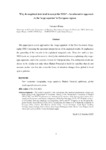Mostrar o rexistro simple do ítem
Why do empirical tests tend to accept the NEG?- An alternative approach to the 'wage equation' in European regions
| dc.contributor.author | Bruna, Fernando | |
| dc.contributor.other | Departamento de Análise Económica, Grupo C+D | es_ES |
| dc.date.accessioned | 2015-10-19T12:47:51Z | |
| dc.date.available | 2015-10-19T12:47:51Z | |
| dc.date.issued | 2015-10 | |
| dc.identifier.issn | 1696-6376 | |
| dc.identifier.uri | http://hdl.handle.net/2183/15383 | |
| dc.description.abstract | [Abstract]This paper posits a new approach to the ‘wage equation’ of the New Economic Geography (NEG) stressing the uncertain interpretation of its empirical results. It emphasizes the generality of the variable to be explained, marginal costs. Then, two artificial (no-NEG) tests are proposed in order to identify the statistical features explaining why wage-type equations tend to be accepted in tests for European data. The estimation results are shown to be similar not only when Market Potential is built for variables that do not measure market size but also when the focus of attention changes from global to local spatial patterns. | es_ES |
| dc.language.iso | eng | es_ES |
| dc.publisher | Asociación Española de Economía y Finanzas Internacionales (AEEFI) | es_ES |
| dc.relation.ispartofseries | DEFI | es_ES |
| dc.relation.ispartofseries | 15-11 | es_ES |
| dc.relation.uri | https://ideas.repec.org/p/aee/wpaper/1511.html | es_ES |
| dc.rights | Reconocimiento 4.0 Internacional | |
| dc.rights.uri | http://creativecommons.org/licenses/by/4.0/ | |
| dc.subject | New economic geography | es_ES |
| dc.subject | Wage equation | es_ES |
| dc.subject | Market potential | es_ES |
| dc.subject | Spillovers | es_ES |
| dc.subject | Global trend | es_ES |
| dc.subject | Spatial autocorrelation | es_ES |
| dc.title | Why do empirical tests tend to accept the NEG?- An alternative approach to the 'wage equation' in European regions | es_ES |
| dc.type | info:eu-repo/semantics/workingPaper | es_ES |
| dc.rights.access | info:eu-repo/semantics/openAccess | es_ES |






